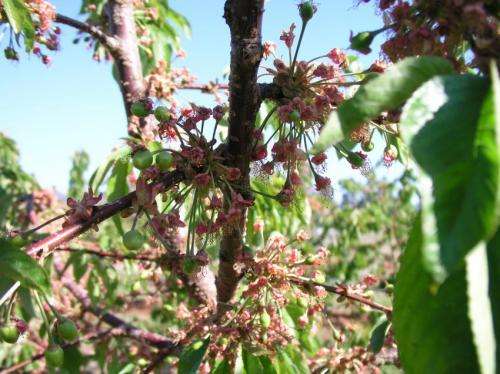Irrigation, soil management strategies investigated for cold climate sweet cherry

Previous research efforts have identified several management strategies to improve establishment of new plantings of sweet cherry trees. These strategies include pulse fertigation, surface mulching, and polypropylene groundcover, which have been shown to improve nutrient and water acquisition. The authors of a new study say that, until now, little research has been conducted on water requirements for sweet cherry. Their study reveals important information about irrigation strategies for growers and includes recommendations that can inform management practices.
"There have been few studies on fruiting cherry trees with respect to novel irrigation strategies such as partial and deficit irrigation, which have been intensively researched worldwide for several other tree fruits," said Gerry Neilsen, lead author of the study. Neilsen and colleagues Denise Neilsen, Frank Kappel, and T. Forge from the Agriculture and Agri-Food Canada, Pacific Agri-Food Research Centre, conducted research to determine the response of two sweet cherry cultivars to a variety of nutrient and water management strategies (HortScience, February 2014). Experiments were conducted in a cold climate where variable spring temperatures among years allowed the team to evaluate climate effects on growth, productivity, and fruit quality.
Research was conducted in a sweet cherry orchard of 'Cristalina' and 'Skeena' cultivars on the dwarfing rootstock Gisela 6 at the Pacific Agri-Food Research Center in Summerland. Three soil management treatments were maintained throughout the experiment: an unamended control, a 10-cm wood waste mulch treatment, and an annual fertigated application of 20 g of phosphorous (as ammonium polyphosphate) per tree at full bloom.
Several soil management treatments, which improved establishment of sweet cherry on Gisela 6 rootstock, were continued for three fruiting seasons; two of these years had cool and wet springs. Analyses showed that high-frequency irrigation resulted in higher root zone soil moisture content relative to low-frequency irrigation despite reduced evaporative demand during part of the growing season. "An important factor affecting yield during the study period was weather, which affected cultivars differently. Low yield and cropload in two seasons were associated with cold, wet springs for 'Skeena' but not 'Cristalina'. Differences in cultivar response were related to their different rates of phenological development," Neilsen said.
Analyses revealed that cherry fruit size was minimally affected by soil and water management, although variations were closely associated with variations in cropload. The authors noted that low croploads during the study period may also have contributed to reduced effects of treatments on cherry quality characteristics other than size.
The researchers found that increased soluble solids concentration (SSC) occurred with low-frequency irrigation, while decreased SSC occurred with delayed harvest maturity in trees receiving phosphorous fertigation at bloom. "The mitigation of these effects at low cropload suggests that variations in cropload can make an important contribution to year-to-year variation in sweet cherry fruit quality and response to treatments," the authors said.
More information: The complete study and abstract are available on the ASHS HortScience electronic journal web site: hortsci.ashspublications.org/c … nt/49/2/215.abstract
Journal information: HortScience
Provided by American Society for Horticultural Science


















